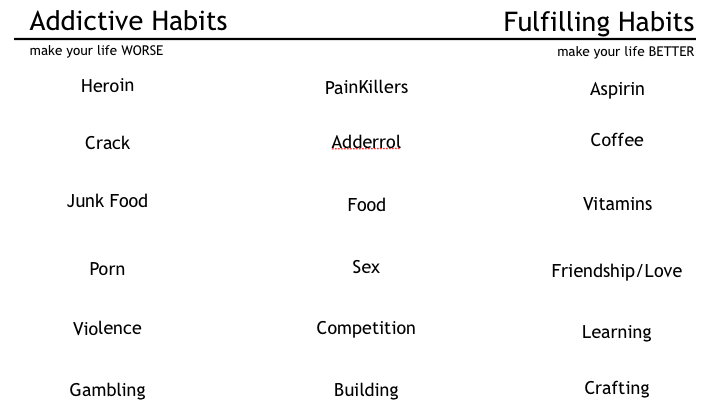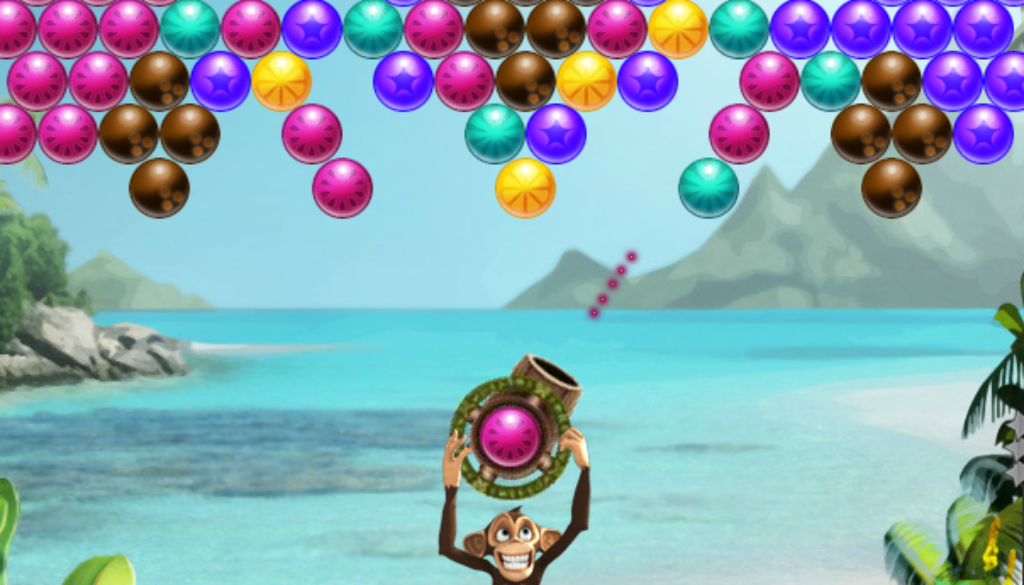The Difference Between Addiction and Fulfillment
As a social game designer, it’s my business to design systems that drive sustained engagement. But when does engagement spill over into addiction? Usually that happens when someone does something TO EXCESS – and that activity has a negative impact on their lives.
Most people who play World of Warcraft, League of Legends, or Candy Crush Saga don’t become addicted – just as most people who visit Las Vegas don’t become slot machine zombies. These gaming experiences are designed to drive compulsion and repeat play; it’s up to the player to know when to walk away.
Recently, during a challenging time in my life, I started playing Bubble Safari (match-3 games are my escapist gaming crack). It’s a charming, absorbing game – filled with progress metrics and accessible rewards. I found myself playing late at night, first thing in the morning – whenever I wanted to get a quick hit of accomplishment and flow (and avoid something messy and challenging).
Last night, after we got the kids to bed, my husband wanted to talk about our loan refinance — but I was so absorbed in playing my game that I told him to wait. He looked at me, shook his head, and said “Face it – you’re an addict.” BUSTED. Game Over.
[tweetable]When a game starts interfering with your real life commitments and relationships, it’s time to walk away.[/tweetable]
What does it take to design games and services that enrich your life and make it more FULFILLING? I think it comes down to the habits you building, and how they affect your life. Fulfilling Habits make your life BETTER – while Addictive Habits make your life WORSE.
habits that enhance your life – a glass of red wine with dinner, a gambling weekend in Vegas, a quick match-3 game to take a mental break and escape the complexity of everyday life – will make your life worse when done to EXCESS.
It’s not the activity itself – it’s the USE PATTERN that causes problems.
So I made a chart to wrap my mind around these ideas. Take a look. What jumps out at you?

The habits on the left – gambling, porn, junk food, violent media, heroin – are innately PRONE to driving addictive behavior, because they promise more than they deliver and activate your nervous system in an unbalanced way (e.g. spiking adreneline without physical activity). Whereas the habits on the right – love, friendship, building, crafting, learning, exercising, sports – are fulfilling when done regularly (not to excess) and stimulate your nervous system in a more balanced way.
[tweetable] Addictive habits promise more than they deliver; fulfilling habits deliver on their promise. [/tweetable]
What kind of games and services do YOU want to build? How do you feel about addiction in software design? I’d love to hear what you think.

September 10, 2012 @ 7:12 pm
My favorite line is “because they promise more than they deliver.” I work for a startup that helps people achieve lifestyle changes like weight loss, smoking cessation, etc. We’ve often had discussions about how to make our product engaging/addictive so that, in essence, people are addicted to doing good things. But to your point, addiction can’t ever be “good,” because it’s a result of being unfulfilled. I imagine this is one of the reasons why Lift’s team decided against game mechanics (as they mentioned in one or two interviews that I’ve read).
September 10, 2012 @ 8:25 pm
Everything in moderation. Including moderation. The chart has me thinking about diagnostics – how to be sure that you’re tweaking the appropriate knobs for habits, to steer positively rather than negatively. I’m building a lot of mini-diagnostics like this… would that be useful for #gamification folks?
September 11, 2012 @ 7:34 am
You know, I am a game developer and I am always thinking about benefit from games what we do. I played a lot in World of Warcraft, Lineage 2, Counter-Strike and another games in my childhood and it wasn’t good for me. So, I won’t create games that can do harm. But if we won’t create an addictive games, how we can get money from users to live? It’s all about balance. I decided we need to listen our heart and do what we want and then, I believe that we’ll create something good.
September 28, 2012 @ 8:07 pm
Right on! I’m with you – and I think there are an increasing number of people like you and I who want to create compelling experiences that don’t suck the life out of people.
What's Your Comfort Habit? | The Change Anything Blog
September 13, 2012 @ 3:07 pm
[…] Note: Thanks to Amy Jo Kim’s blog post on the topic “addiction vs. fulfillment,” which sparked ideas for this […]
September 16, 2012 @ 11:53 am
Lots to think about here, thanks for writing this. I like the last line in your chart “building” very much. Never thought about crafting and gambling as two sides of the same coin. Very insightful!
September 28, 2012 @ 8:07 pm
thanks for your comment, much appreciated. I get these insights from watching my kids play games, and seeing the motivational pull and (most especially) the after-effects of different play mechanics.
September 19, 2012 @ 4:41 am
Addiction is a messy word.
I think its important to distinguish chemical addiction from psychological addiction. The difference here comes down to what it would take to break the habit (You could, feasibly, get up one day and just not feel like playing WoW anymore, but if you’re a Heroin junkie, you’re body will never let you do that).
I remember reading that with many psychological addictions, they tend to be symptoms of another problem. More precisely, they are methods of self medicating for some other concern in life. I believe the suggestion was that, for some obese people, a diet would be treating the symptom, where the cause is elsewhere in their life (unsatisfying job, relationship, history, etc)
With that in mind, it may be impossible to distinguish between healthy and unhealthy habits. Anything that is fun can be used to self medicate. The distinction may be more in the *infrastructure* around the habit. I like the analogy of the ethical barman, who tells a patron when ‘you’ve had enough’. In WoW terms, that would be the decreasing XP gain with consecutive hours of play.
September 28, 2012 @ 7:16 pm
great points, Tony – thanks for commenting. Will engage more will these ideas in a coming post. I look forward to hearing more about your ideas and experiences.
October 5, 2012 @ 11:25 pm
If you could build something as addictive as facebook, would you do it?
I think I would 🙁
April 17, 2013 @ 6:52 pm
Hi, This is a good information, thank you.
April 20, 2013 @ 10:33 am
I was looking for this certain info for a very long time. Thank you and best of luck.